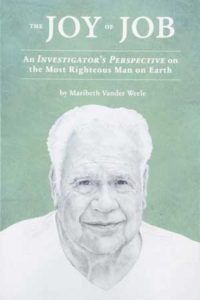The Joy of Job: An Investigator’s Perspective on the Most Righteous Man on Earth
Reviewed by Michael Willett Newheart
March 1, 2019
 By Maribeth Vander Weele. Sagerity Press, 2018. 138 pages. $24.99/paperback; $9.99/eBook.
By Maribeth Vander Weele. Sagerity Press, 2018. 138 pages. $24.99/paperback; $9.99/eBook.
The Epistle of James speaks about the “patience of Job,” but in this little book, Maribeth Vander Weele speaks about his joy. She quotes Bildad’s statement to Job, “He will yet fill your mouth with laughter and your lips with shouts of joy” (Job 8:21).
Vander Weele presents “an investigator’s perspective.” She is the founder of her own investigative firm, the Vander Weele Group, and she explicitly uses the tools of her trade to study the book of Job. In a concluding word, Vander Weele outlines ten elements that investigators look for, and then she summarizes how each of these elements relates to her study of the book of Job. (In many ways, one should read this section first.)
On the cover appears a portrait of Vander Weele’s father, Dr. Harold Vander Weele, drawn by her sister Susan Vander Wey. (It’s a family affair!) Vander Weele learned from her father the value of “the throwaway line,” which she argues is important to the investigator and to the book of Job.
The book’s title page includes an additional subtitle: “An Extraordinary Story of Repentance and Restoration.” And Job’s story is certainly extraordinary! It is also familiar: Job is a good man with many possessions. Satan tells God that if everything is taken away from Job, even his own health, then he will curse God. God lets Satan do with Job as Satan will: he takes away Job’s property, children, and health. Job remains faithful, and God eventually restores his fortunes.
Sagerity Press published this book and apparently only this book. The only other occurence of the word “sagerity” that I could find was Sagerity Investigative Intelligence, a service provided by the Vander Weele Group. Vander Weele does not discuss the origins of this name “Sagerity,” which seems to be a neologism. I can only assume that it derives from the fact that Job is often classified as wisdom literature, along with Proverbs and Ecclesiastes.
Vander Weele does not refer to academic research on Job at all. In all fairness, however, scholars have not written a lot of books on Job for the general public. Indeed, the only really accessible scholarly book on Job is Stephen Mitchell’s 1994 poetic translation and commentary, simply entitled The Book of Job, which Vander Weele does not reference. She does, however, refer a number of times to an 1827 work by John Fry entitled A New Translation and Exposition of the Very Ancient Book of Job. Scattered throughout are occasional quotations of folks such as C.S. Lewis; David Wilkerson (of The Cross and the Switchblade fame); and her pastor, Daniel Meyer of Christ Church of Oak Brook, Ill., who gushes about the book on the back cover.
Vander Weele is in dialogue not with scholars but with her child self. She says she was taught that the lesson of Job was that innocent people can suffer without reason, that God’s ways are mysterious. Job 29 is Vander Weele’s point of entry. Her calling Job “the most righteous man on earth” in the subtitle is a bit sarcastic because her contention is that Job is unrighteous and that God is righteous.
This “investigator’s perspective” is very much a Christian perspective, with lots of support from pastors, according to the acknowledgments. (She does refer to Rabbi Jonathan Sacks’s book on religious violence, Not in God’s Name.) Vander Weele’s many footnotes primarily cite Job but also other verses in the Hebrew scripture and New Testament. I appreciate her attempting to ground Job in the Christian Bible.
The book is interesting if a bit idiosyncratic. In some ways, it is a personal journey but strangely impersonal. Vander Weele is an investigator, so she keeps her own emotions and story out of the equation, but I expected a bit more when I saw the tender portrait of her father on the cover. Friends might read this book with profit, though the only explicit reference to the Society is a paragraph about “the Quaker Capitalism of the Nineteenth Century,” in which she refers to a book by Deborah Cadbury about her chocolate-making ancestors. For modern interpretation of Job, I am partial to two twentieth-century dramatic works: Archibald MacLeish’s 1958 play in verse J.B. and Neil Simon’s 1974 comedy God’s Favorite. It seems that the stage has captured—or unleashed—Job better than the written word.



Comments on Friendsjournal.org may be used in the Forum of the print magazine and may be edited for length and clarity.